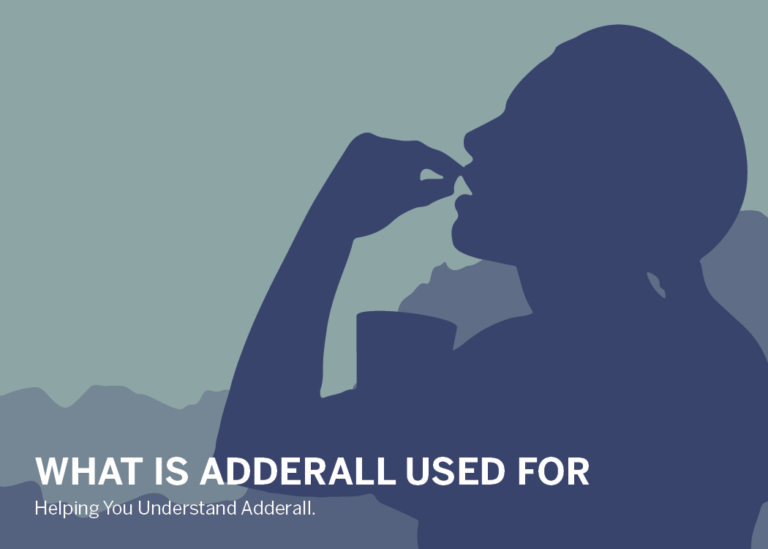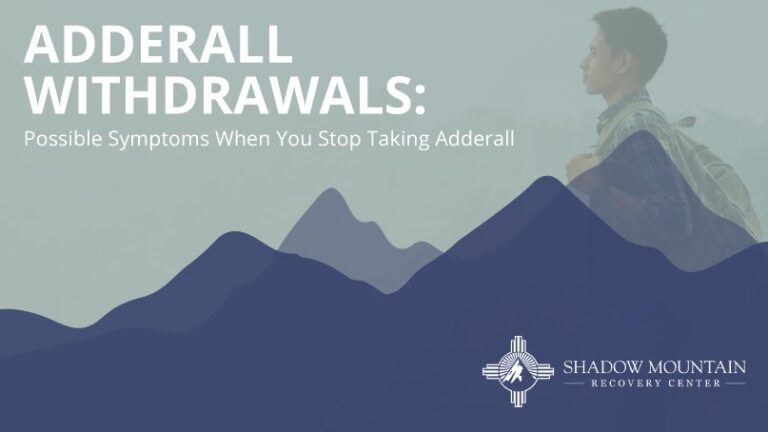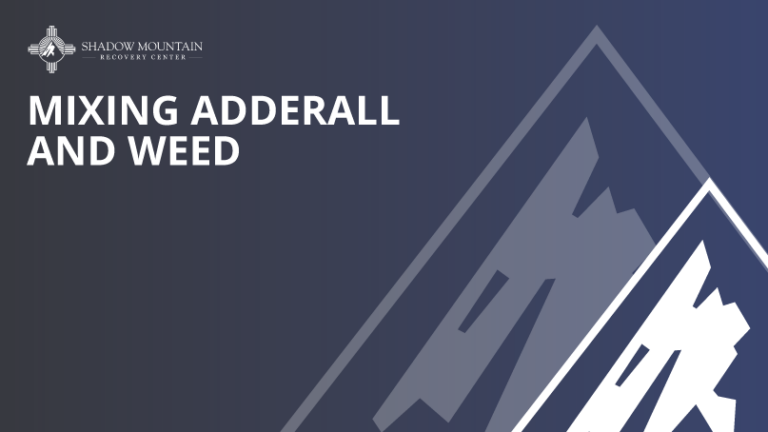Adderall Side Effects
It’s not hard to understand why there is a draw to a drug like Adderall. It gives a person increased focus, attention to detail, helps them stay awake longer, and overall provides a rush of energy that is hard to match. For those prescribed Adderall it does all of these things with the safety of having a doctor’s approval behind it.
For those reasons, it’s easy to understand why Adderall is incredibly popular on college campuses and in professional settings. When you have to stay up late to cram for an exam that’s worth 25% of your overall course grade, or you have to stay up to finish paperwork before a big meeting in the morning, you might be tempted to turn to Adderall.
Adderall can also pose severe risks, especially when taken without approval from a healthcare professional.
What Is Adderall?
Adderall is a brand name for a mix of two drugs (dextroamphetamine and amphetamine). Typically, attention-deficit/hyperactivity disorder (ADHD) and narcolepsy are what Adderall is used for.
The drug is designed to chemically alter things that naturally occur in the brain, releasing hormones like dopamine. In doing this, it helps those with ADHD improve their focus and concentration.
As a stimulant that affects the central nervous system, Adderall can give those without ADHD a similar feeling of attentiveness and focus.
There is a long list of side effects that can occur for a person using Adderall as prescribed — and the list is even longer for someone without a prescription.
Should I Be Taking Adderall?
This is a question 100% intended for your primary care physician. They will be able to guide you in the direction necessary to determine if Adderall is right for you.
If you feel you have ADHD, talking with your doctor may assist you as you explore the symptoms.
The symptoms of ADHD are defined by the American Psychiatric Association’s Diagnostic and Statistical Manual, Fifth Edition. This is commonly referred to as the DSM-5. The Centers for Disease Control and Prevention (CDC) has listed these identifiers for ADHD here.
If you’re reading this with no intention of contacting a doctor and only intend to take Adderall for a buzz, we ask you to please keep reading to learn about the dangers that may arise from this.
How Does Adderall Make You Feel?

Adderall, as stated above, is used for, and effective in, improving focus and concentration.
In general terms, that’s how Adderall makes you feel. It’ll give you a lot of energy and help you concentrate.
Adderall can also severely affect a person’s mood and emotional state, though.
If a person takes high doses of Adderall for a prolonged period of time, they can become dependent on the drug. When dependency takes over, it can cause great damage to a brain that then believes it no longer needs to produce hormones like dopamine on its own.
In addition to improving focus, Dopamine is a hormone that makes you feel things like happiness, pleasure, and joy.
When you have caused this damage, you, and especially those around you, can notice personality changes.
It’s common for people with Adderall dependency to experience mood swings, lethargy (lack of enthusiasm or excitement), irritability, or general depression.
When this happens, the only thing most feel can correct it is more Adderall. From here, addiction can occur.
What Are the Side Effects of Adderall Use
The side effects of Adderall use range from mild to severe and are different for every person.
Side effects can include:
- Headache
- Changes in sex drive
- Nervousness
- Dry mouth
- Painful menstrual cramps
- Weight loss
- Diarrhea
- Constipation
More serious side effects include:
- Slurred speech
- Confusion
- Dizziness
- Numbness in arms and legs
- Agitation
- Paranoia (fear others want to harm you)
- Teeth grinding
- Mania
- Hallucination (seeing or hearing things that aren’t there)
- Swelling around eyes and on face
- Blue coloring on fingers and toes
Food and Drug Interactions With Adderall Abuse
There are different answers to the question of food and drug interactions with Adderall depending on what form of Adderall you take. It comes in different forms and different dosages.
In general, there is a list of substances and products that should be avoided.
- Marijuana
- Combining marijuana with Adderall can increase blood pressure and heart rates. It may also cause issues with sleeping and nervousness/anxiety.
- Heart issues can occur by mixing these substances together due to their opposing effects.
- Foods
- Most foods do not interact with Adderall. However, foods that alkalinize urine can cause small issues with the speed of amphetamine leaving the body. These foods include beets, spinach, and kale. These foods can still be consumed unless one is instructed by a doctor not to eat them.
- Alcohol
- Alcohol should not be consumed when using Adderall. Consumption of alcohol can cause the Adderall dosage to release quicker into a person’s system. This can result in anxiety, insomnia (trouble sleeping), increased blood pressure, increased heart rate, heart attack, or stroke.
- Caffeine
- Limit caffeine intake when taking Adderall. Foods and beverages that normally contain caffeine include coffee, tea, soda, and chocolate.
- Caffeine intake can cause nausea, nervousness, heart palpitations, tremors, rapid heartbeat, or insomnia (trouble sleeping).
- Acidic beverages and foods
- Again, most foods will not interfere with Adderall. It’s often recommended that those taking Adderall avoid consuming acidic products such as orange juice, grapefruit juice, and citrus fruit for one hour before, during, and one hour after the dosage of Adderall. Doing so may result in a decrease in the body’s ability to absorb the medication.
When beginning a prescription for Adderall, always consult with your doctor to see if there should be changes to your diet or lifestyle.
Signs of An Adderall Addiction
Adderall misuse is common and very concerning for the person doing the misusing.
Because of the drug’s ability to improve focus and concentration, many (mostly students and professionals) will take Adderall to help. For those with loved ones in college courses, high school, or working in a stressful and high-paced professional setting, it’s important to know the signs of Adderall dependency and addiction.
Any of the following or a mixture of the following could be signs of Adderall addiction:
- Insomnia (can’t sleep)
- Nervousness
- Nausea
- Consistent headaches
- General agitation
- Aggressiveness
- Loss of appetite
- Hallucinations
- Seizures
- Paranoia
- Mood swings
Treatment for Adderall
Treatment for Adderall misuse comes with a slight advantage that many other drugs do not provide, which is that withdrawal from Adderall is typically much less painful and overwhelming than it is with other drugs.
While it’s true that Adderall withdrawal symptoms are minimal, it would be false to say that no symptoms occur. In most instances, a person attempting to stop Adderall misuse will have feelings of depression and general sadness. They will also feel fairly tired for days and up to a week.
When a person misuses Adderall, their brain becomes used to the fact that the pill does the work of helping them stay motivated and focused. It’s also common for someone to feel like they cannot keep focus while withdrawing from Adderall.
Regardless of the lack of severe withdrawal symptoms, it’s in the best interest and safety of anyone who is looking to stop Adderall misuse to have medical professionals supervise the detox process.
After detox, if necessary, treatment can begin.
In treatment for Adderall addiction, there are a few things that are required to really reach the root of the addiction and begin the recovery process.
Having great psychotherapy options that include cognitive-behavioral therapy (CBT) will go a long way in Adderall addiction treatment. By working on cognition (the process of gaining knowledge) rather than behavior (the way a person acts or conducts themself), clients are able to learn about why they use the drug they do.
With Adderall misuse, the reason for beginning use can be lost as a person becomes more dependent on it.
On top of evidence-based treatments like CBT, alternative paths to treatment with outdoor activities like hiking, yoga, and meditation can be helpful.
Thankfully, at Shadow Mountain Recovery, you can receive all of these things and more.
Start Recovery with Shadow Mountain
If you’re ready to take back control of your life and would like to experience quality Adderall detox and treatment, Shadow Mountain Recovery can help you.
With locations in Taos, Sante Fe, and Albuquerque, Shadow Mountain exists to make treatment possible while among the serenity and beauty the southwest provides.
Using evidence-based therapies, alternatives to 12-step programs, and alternative therapy models, Shadow Mountain gives its clients a holistic approach to treatment.
The process of recovery is made easier with a dedicated staff and a caring hand.
To begin recovery for Adderall addiction or misuse, or to simply ask questions about how to help your loved one, call us today at 855-596-0196.






